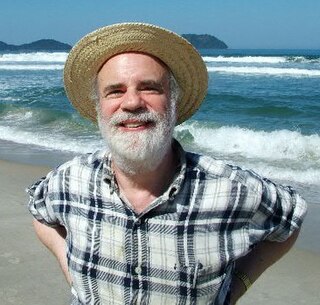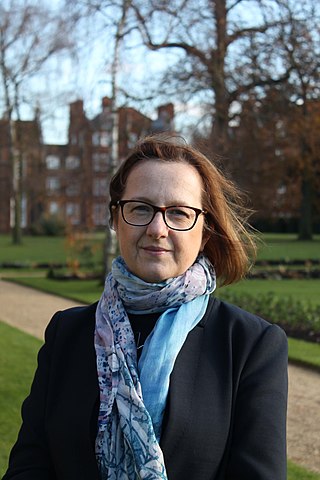Related Research Articles
Semantics is the study of reference, meaning, or truth. The term can be used to refer to subfields of several distinct disciplines, including philosophy, linguistics and computer science.

Saul Aaron Kripke was an American analytic philosopher and logician. He was Distinguished Professor of Philosophy at the Graduate Center of the City University of New York and emeritus professor at Princeton University. Kripke is considered one of the most important philosophers of the latter half of the 20th century. Since the 1960s, he has been a central figure in a number of fields related to mathematical and modal logic, philosophy of language and mathematics, metaphysics, epistemology, and recursion theory.

Rudolf Carnap was a German-language philosopher who was active in Europe before 1935 and in the United States thereafter. He was a major member of the Vienna Circle and an advocate of logical positivism. He is considered "one of the giants among twentieth-century philosophers."

David Kellogg Lewis was an American philosopher who is widely regarded as one of the most important philosophers of the 20th century. Lewis taught briefly at UCLA and then at Princeton University from 1970 until his death. He is closely associated with Australia, whose philosophical community he visited almost annually for more than 30 years.

Ray Jackendoff is an American linguist. He is professor of philosophy, Seth Merrin Chair in the Humanities and, with Daniel Dennett, co-director of the Center for Cognitive Studies at Tufts University. He has always straddled the boundary between generative linguistics and cognitive linguistics, committed to both the existence of an innate universal grammar and to giving an account of language that is consistent with the current understanding of the human mind and cognition.

Robert Boyce Brandom is an American philosopher who teaches at the University of Pittsburgh. He works primarily in philosophy of language, philosophy of mind and philosophical logic, and his academic output manifests both systematic and historical interests in these topics. His work has presented "arguably the first fully systematic and technically rigorous attempt to explain the meaning of linguistic items in terms of their socially norm-governed use, thereby also giving a non-representationalist account of the intentionality of thought and the rationality of action as well."
Keith Lehrer is Emeritus Regent's Professor of philosophy at the University of Arizona and a research professor of philosophy at the University of Miami, where he spends half of each academic year.

Stephen Roy Albert Neale is a British philosopher and specialist in the philosophy of language who has written extensively about meaning, information, interpretation, and communication, and more generally about issues at the intersection of philosophy and linguistics. Neale is a Distinguished Professor of Philosophy and Linguistics and holder of the John H. Kornblith Family Chair in the Philosophy of Science and Values at the Graduate Center, City University of New York (CUNY).
Robert Culp Stalnaker is an American philosopher who is Laurance S. Rockefeller Professor Emeritus of Philosophy at the Massachusetts Institute of Technology. He is a Fellow of the American Academy of Arts and Sciences and a Corresponding Fellow of the British Academy.

In analytic philosophy, philosophy of language investigates the nature of language and the relations between language, language users, and the world. Investigations may include inquiry into the nature of meaning, intentionality, reference, the constitution of sentences, concepts, learning, and thought.

Michael Devitt is an Australian philosopher currently teaching at the City University of New York in New York City. His primary interests include philosophy of language, philosophy of mind, metaphysics and epistemology. His current work involves the philosophy of linguistics, foundational issues in semantics, the semantics of definite descriptions and demonstratives, semantic externalism, and scientific realism.
Jerrold Jacob Katz was an American philosopher and linguist.
John Patrick Hawthorne is an English philosopher, currently serving as Professor of Philosophy at the Australian Catholic University in Melbourne, and Professor of Philosophy at the University of Southern California. He is recognized as a leading contemporary contributor to metaphysics and epistemology.

Katarzyna Malgorzata "Kasia" Jaszczolt is a Polish and British linguist and philosopher. She is currently Professor of Linguistics and Philosophy of Language at the University of Cambridge, and Professorial Fellow at Newnham College, Cambridge.
Formal semantics is the study of grammatical meaning in natural languages using formal tools from logic and theoretical computer science. It is an interdisciplinary field, sometimes regarded as a subfield of both linguistics and philosophy of language. It provides accounts of what linguistic expressions mean and how their meanings are composed from the meanings of their parts. The enterprise of formal semantics can be thought of as that of reverse-engineering the semantic components of natural languages' grammars.
Herman Wright Cappelen is a Norwegian philosopher. He is currently the Chair Professor of Philosophy at the University of Hong Kong.

Meaning and Necessity: A Study in Semantics and Modal Logic is a book about semantics and modal logic by the philosopher Rudolf Carnap. The book, in which Carnap discusses the nature of linguistic expressions, was a continuation of his previous work in semantics in Introduction to Semantics (1942) and Formalization of Logic (1943). Considered an important discussion of semantics, it was influential and provided a basis for further developments in modal logic.
Adèle G. Mercier is a Canadian philosopher, currently employed at Queen's University, Kingston, and fellow of LOGOS- Language, Logic and Cognition at the University of Barcelona, Spain. She studied at the University of Ottawa and UCLA.
The internal–external distinction is a distinction used in philosophy to divide an ontology into two parts: an internal part concerning observation related to philosophy, and an external part concerning question related to philosophy.
François Recanati is a French analytic philosopher and research fellow at the College de France, and at the Centre National de la Recherche Scientifique. Many of his works focus on the philosophy of language and mind.
References
- ↑ Alexis Burgess, Brett Sherman (eds.), Metasemantics: New Essays on the Foundations of Meaning, Oxford University Press, 2014, p. 29 n. 13.
- ↑ "Review of Metasemantics: New Essays on the Foundations of Meaning". Notre Dame Philosophical Reviews.
- ↑ Stainton, Robert J. Philosophical Perspectives on Language. Peterborough, Ont., Broadview Press, 1996, p. 36.
- ↑ Kasia M. Jaszczolt, Meaning in Linguistic Interaction: Semantics, Metasemantics, Philosophy of Language, Oxford University Press, 2016, p. viii.
- ↑ Ori Simchen, Semantics, Metasemantics, Aboutness, Oxford University Press, 2017, p. xiii.